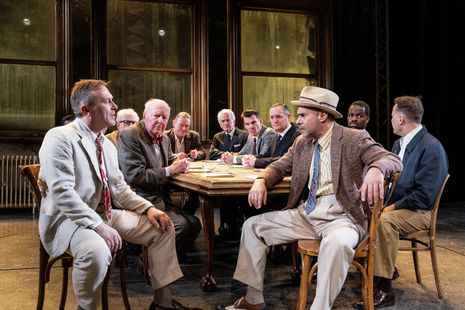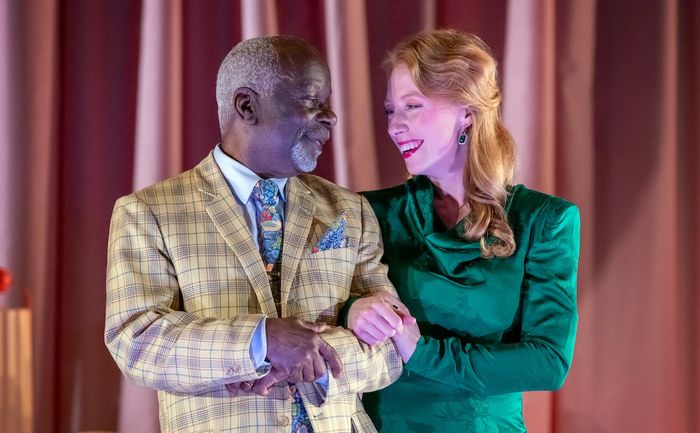The jury’s not out on Twelve Angry Men
Despite being almost seventy years old, Twelve Angry Men hasn’t lost its appeal

It may be best known for its 1957 film adaptation, but Twelve Angry Men is the kind of story that is made for the stage. On the surface, the story is quite simple; in one room, the benign procedural motions of the American justice system decide whether the accused should be found guilty and receive the electric chair. On this particularly hot summer day in New York City, twelve men sit on the jury of a murder case, and must come to a unanimous verdict. Though of course, as the astuteness of Reginald Rose’s play makes evident, nothing is really straightforward when someone’s life is placed in the hands of the largely indifferent public.
Tossed into the jury room, the audience plays catch-up as the facts of the case slowly reveal themselves: a teenage boy is accused of killing his abusive father with a knife. He bought the knife shortly before the murder took place. After his fight with his father (when he allegedly stabbed him), he disappeared to the cinema until the early hours of the morning. The play begins with the jury’s vote: eleven of the men are convinced that the answer is clear cut, except for Juror 8 (Jason Merells).
“There is something slightly surreal about the way the characters interact with one another”
The production of Twelve Angry Men at the Cambridge Arts Theatre is part of the play’s UK tour, following its successful West End run. This particular production, directed by Christopher Haydon (artistic director of The Rose Theatre, Kingston and notably, a Cambridge alum) is beautifully executed and subtly (but so effectively) stylistic in the creation of its world. There is something slightly surreal about the way the characters interact with one another and produce their arguments; it’s clear that Haydon thought a lot about elevated gestures. Movement follows speech very closely in this play. Be it pointing fingers or simply the outstretching of a hand, the intentionality of this choreography keeps the twelve jurors distinct in their individuality (and feels like a nod to Brecht).
Michael Pavelka’s set is show-stopping, which it rightfully should be if you are making a play that needs to pressurise every corner of a singular room. Not only is Pavelka’s design visually inviting, but it is also intuitive, and, like Haydon’s direction, is most effective in its subtleties. I hadn’t realized until the interval that the table, centre stage, had been slowly moving clockwise, keeping with the passage of time required to deliberate the trial. I was also taken with the inclusion of the washroom onstage, which provided the actors with a secondarily private space to process the intensity of their decision, outside of the already ‘private’ room that contains the jurors (plus, real running water onstage is always a novelty).
“Each man is distinct in his vocation, class, and social attitudes”
Of the many things that make this production work, the cast is perhaps to be the most credited with its success. Not one of the twelve jurors is outrightly named, and yet it never seems to matter – each man is distinct in his vocation, class, and social attitudes. Jason Merrells (the play’s greatest voice of moral reason) gets the audience on his side very quickly. His performance is measured and inspiring – as the last to leave the stage, his final moments are a charged and eloquent ending to the play. Furthermore, it does not take long to identify which other men are going to pose the greatest problems to Juror 8’s interest in genuine humanity. Tristan Gemmill has the difficult task of portraying the play’s most fervent antagonist, Juror 3. His character is grating, self-interested, and only knows how to yell, but his performance should, without a doubt, be commended. This is not to forget the rest of the cast, who equally uphold their characters – truly, not a single man felt incomplete.
“The production is so successful because it never tries to be an adaptation”
While Reginald Rose wrote the stage play before the screenplay, I think for many audience members today, it is difficult not to draw comparisons between the two, given the film’s popularity. Buzzings in the audience suggested that the play holds certain tensions and conflicts amongst the men differently than the film, but perhaps that is simply a regular consequence of two different mediums. Rather, it seems the production is so successful because it never tries to be an adaptation – it relishes in making the most of its theatrical space.
Above all, the singular room of Twelve Angry Men still stands as a pressurising allegory for the state of America as a whole. In Haydon’s version, he and his twelve actors astutely reveal the ironies and toxic masculinities infecting the characters of Rose’s story, and together, they ensure the play’s promotion of humanity is just as meaningful and interesting to watch for an audience today as it was seventy years ago.
Twelve Angry Men is playing at The Cambridge Arts Theatre until Saturday 27 April, 2024.
 News / Judge Business School advisor resigns over Epstein and Andrew links18 February 2026
News / Judge Business School advisor resigns over Epstein and Andrew links18 February 2026 News / Gov grants £36m to Cambridge supercomputer17 February 2026
News / Gov grants £36m to Cambridge supercomputer17 February 2026 News / CUCA members attend Reform rally in London20 February 2026
News / CUCA members attend Reform rally in London20 February 2026 News / Union speakers condemn ‘hateful’ Katie Hopkins speech14 February 2026
News / Union speakers condemn ‘hateful’ Katie Hopkins speech14 February 2026 News / Hundreds of Cambridge academics demand vote on fate of vet course20 February 2026
News / Hundreds of Cambridge academics demand vote on fate of vet course20 February 2026










